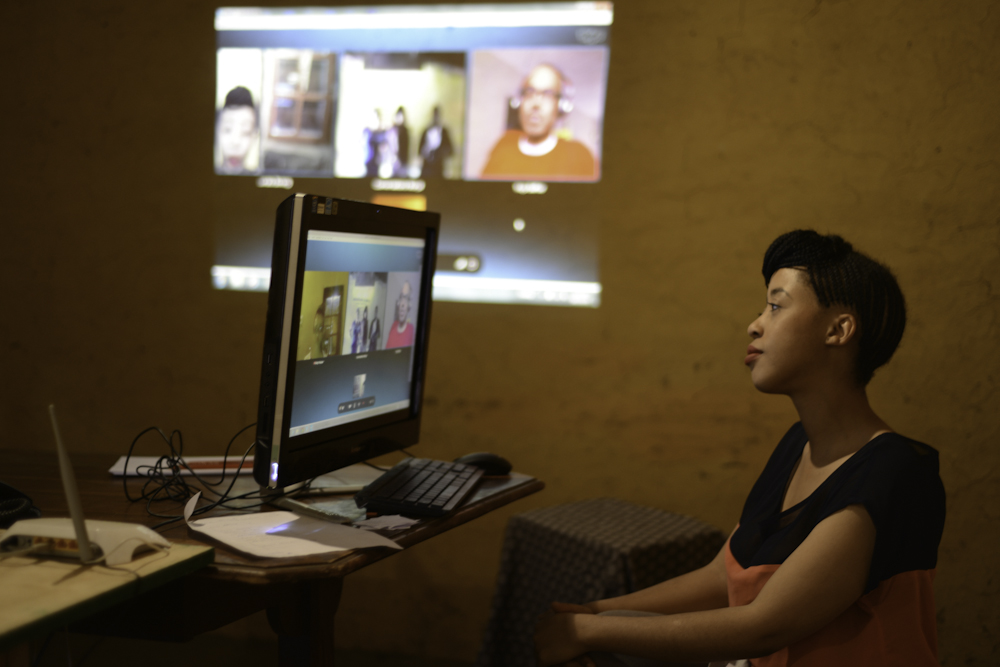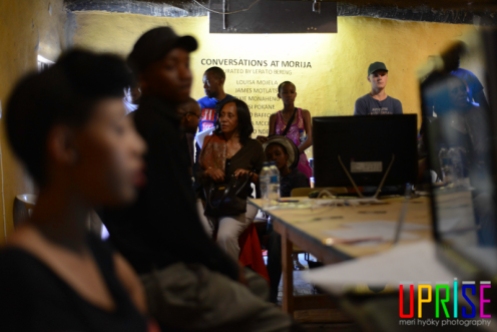Originally posted on Morija.co.ls
By Leila Hall
“For the younger generation of the Basotho diaspora, especially, I hope that the Conversations provide the inspiration to do more… I hope that this is an example of what can be done.”
Maeder House – one of the oldest recorded buildings in Lesotho – stands quietly and unobtrusively next to the Morija Printing Works. Its simple brick walls, thatched roof and low doorways proclaim nothing about its historical significance to passers by.
Today, however, this unassuming building is the venue for a one-of-a-kind event. It is a hot, glaringly bright day in Morija, where the town’s annual Arts and Cultural Festival is taking place. Directly behind Maeder House, there is a bustle of tents and stalls selling food and crafts. Music drifts through the air from a nearby stage.
A steady trickle of people walk up the steps to the doorway and enter the building’s cool, dim interior. In the centre of the room, a large table has been set up with computers. Those who have just entered sit down on one of the benches lining the walls and listen. There is a conversation taking place.
Lerato Bereng, the curator of the event, speaks directly to the screen in front of her: “Here we are, skyping in one of the oldest buildings in Lesotho.”
The person at the other end of the line is projected onto one of the mud-smeared walls. The participants in the room are talking to Pepsi Pokane – actor, television presenter, director and businessman. Although originally from Lesotho, Pokane is speaking to the room from Johannesburg, where he currently lives and works.
There are instructions on another wall – immediately visible as one enters the room. One of them reads: ‘Join the conversation by speaking directly into the microphone and webcam.’ Although many of the people in the room are happy to be onlookers, the invitation to participate in the discussion is extended to all.
Bereng turns to the participants in the room: “Does anyone have anything they would like to ask Pepsi?” ‘Me ‘Matsepo Ramakoae – Lesotho’s Deputy Minister of Finance – sits down in front of one of the computers. Her question is simple and direct. “Pepsi,” she says, “when are you coming home?”
Smiles and laughter fill the room. Pokane’s face registers a mixture of surprise and amusement. He is clearly taken aback. His reaction is much the same when another participant asks him if he has any ideas for creative projects in Lesotho.
“Lesotho is not engaging with us,” he says. There is a pause, and – almost immediately – he acknowledges his own responsibility in this: “I could also be engaging, but I’m not – and I can’t really say why.”
As the conversation wraps up, Pokane declares: “I’m thinking now that we should be filming a movie here – and this is sparked by this conversation. It’s a new thought – I haven’t given this serious consideration before.”
Ramakoae leans again into her computer screen and assures him: “We as government are willing to engage with you.”
He smiles. “When I am next at home, I will come and speak to you.”
Pokane is one of a number of prominent figures who have been invited to engage – via Skype – in the day-long event. The impressive list of participants also includes Desmond Dube, actor and entertainer; Louisa Mojela, CEO of WIPHOLD; and Mphethi Morojele, founder of MMA Architects, South Africa’s first black-owned architecture firm.
Although from many different walks of life, the invited participants have something important in common: they are all members of Lesotho’s diaspora – people who were born in the country, or who at some point lived or worked in the country – but now are primarily based elsewhere.
Bereng, who is curating Conversations at Morija as part of her MFA, explains that a major focus of her work is the idea of accessibility within the visual arts. “I’m very interested in how curators can utilise certain tools to engage broader audiences,” she says. “I wanted to create an event where the Basotho diaspora are acknowledged for their achievements, but not in an inaccessible way. I wanted the public to realise that these are real people that they can speak to, that ke Basotho. That was very important to me.”
“The idea for the Conversations stemmed from my own position as a member of the diaspora,” explains Bereng. “Having been sent to boarding school and university in South Africa, I haven’t technically lived in Lesotho since I was 12. And yet, this is very much ‘home’. I am constantly conscious of my foreigness when I’m in Johannesburg, but strangely also when I’m here. I think a lot of us who are in the diaspora are in a very strange position of not quite belonging anywhere. Lesotho remains more of a home to me than anywhere I have lived.”
In the course of the day, several of the participants comment on this ‘in-between’ position. “You are living this migrant life,” says Mphethi Morojele, “You are living in two places at once.”
Louisa Mojela expresses something similar: “I consider myself a migrant labourer. Periodically, I go home – as often as once, twice, even four times a month. Lesotho is part of me – I can’t take that out of me.”
As an extension of Conversations, Bereng is planning a publication titled Haueeng Banna,which will bring together multi-media contributions from members of the diaspora, as well as accomplished individuals living in Lesotho. The title of the publication is drawn from a song by Lesotho hip-hop artist Kommanda Obbs. The song tells the story of both sides of the border: it includes the voices of those who have remained in Lesotho, as well as two characters who have made the journey to South Africa in search of better job opportunities.
Future plans also include holding a continuation of the Conversations at next year’s Festival in Morija. More than anything, however, Bereng hopes that the Conversations will be a starting point for more members of the diaspora to creatively engage with the country.
“It seems like a lot of the diaspora are looking for ways to engage, but nobody knows how to yet, which was also my problem for many years.”
“One of the issues that was touched on in the Conversations was the absence of creative platforms in Lesotho. We talk of the need for creative engagement, but the fact is that these spaces do not exist.”
“There comes a point, however, where you have to get over it, and you have to just do it. No one is going to make it happen unless you say it should happen – no-one cares, no-one even knows that something is missing until you point it out. You have to make the space happen.”
“The definitions of what we consider ‘art’ or ‘literature’ were born elsewhere, and brought here, and they have not been assimilated properly with the culture. Our generation is in a unique position. We are in a sense defining things for the very first time in a Lesotho context, and it is important for us to carve out niches and definitions so that they have immediate resonance to our context. We need to think of new ways – Lesotho ways – of doing things.”
“For the younger generation of the Basotho diaspora, especially, I hope that the Conversations provide the inspiration to do more. For those who are nervous or unsure, I hope that this is an example of what can be done.”













One thought on “Creative dialogues: engaging with Lesotho’s diaspora”